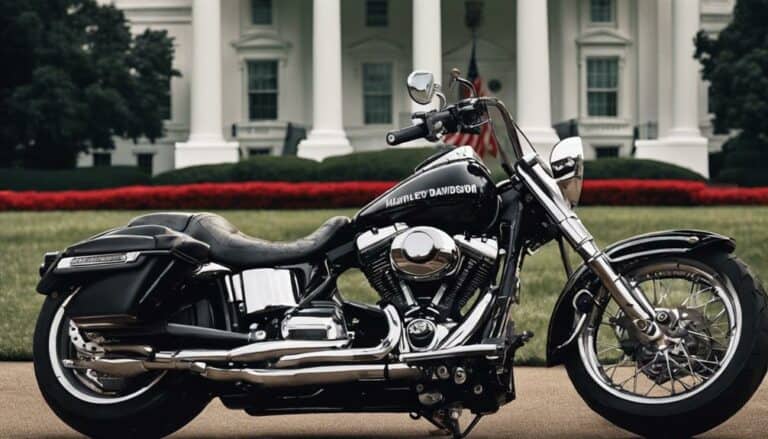Imagine a storm brewing as President Trump's words thunder over Harley-Davidson's decision to shift production. His stance has sparked debates and raised questions about the future of this iconic American company. But what exactly did Trump say about Harley Davidson that has caused such a stir?
The implications of his comments go beyond mere criticism, hinting at potential repercussions that could shape the landscape of both the automotive industry and international trade.
Key Takeaways
- Trump criticized Harley for shifting production overseas.
- Trump urged Harley to prioritize American manufacturing.
- Trump called for a boycott due to disagreements.
- Trump expressed concerns over the impact on the manufacturing sector.
Trump's Criticism of Harley's Decisions
Trump criticized Harley-Davidson's decisions regarding production shifts overseas, expressing concern over the potential negative impact on American manufacturing. His disappointment in the company's choice was evident as he stressed the importance of keeping operations within America. Through a tweet, Trump urged Harley-Davidson to maintain 100% of its production in the U.S. to prevent losing ground to competitors. The President's criticism highlighted his worries about the consequences of such a move on the manufacturing sector in the country.
In his statements, Trump emphasized the need for companies like Harley-Davidson to prioritize American manufacturing for the benefit of the nation's economy. By questioning the decision to shift production overseas, he underscored the significance of supporting domestic industries. Trump's stance reflected his commitment to safeguarding American manufacturing and ensuring that companies contribute positively to the country's economic growth.
Impact of Tariffs on Harley
The increase in European tariffs on Harley-Davidson motorcycles has significantly impacted the company's financial performance and market outlook. The tariffs on Harley-Davidson bikes rose from 6% to 31%, with further increases planned, reaching 56% by June 2021. These tariffs were a response to Trump's tariffs on steel and aluminum, which affected the European Union and subsequently Harley-Davidson. To mitigate the impact of these tariffs, the company shifted some production to Thailand to reduce costs. The financial performance of Harley-Davidson has been notably influenced by these tariffs, leading to a shift in their market outlook. The table below outlines key points related to the impact of tariffs on Harley-Davidson.
| Topic | Details |
|---|---|
| Tariff Increase | European tariffs on Harley motorcycles rose from 6% to 31% |
| Production | Some production moved to Thailand to cut costs after EU tariffs |
| Financial Impact | The tariffs have significantly affected Harley's financial performance |
Trump's Call to Boycott Harley
Following the announcement of plans to shift some production overseas, a call for boycotting Harley-Davidson was made by President Trump. Trump criticized the company for its decision to move manufacturing abroad in response to EU tariffs. He viewed this move as a betrayal by the iconic American company, reflecting his displeasure with their strategic choices amidst escalating trade tensions.
The boycott suggestion was a direct result of Trump's stance on American manufacturing and his disagreements with Harley-Davidson's actions. The call for boycotting Harley-Davidson underscores the increasing tensions between the company and the U.S. government under the Trump administration.
As the situation unfolds, the implications of such a boycott on both Harley-Davidson and the broader economic landscape remain to be seen. Trump's vocal opposition to the company's decision highlights the complexities of navigating global trade dynamics and maintaining American manufacturing interests.
Harley's Response to Trump's Comments
Amidst the escalating trade tensions and differing perspectives on manufacturing decisions, Harley-Davidson responded to President Trump's criticisms by emphasizing the necessity of their strategic shift in production. The company said the move to shift some production overseas was a strategic decision to address the financial impact of EU tariffs. They clarified that this adjustment did not involve relocating production to Europe directly due to tariffs. In a focused response, Harley-Davidson highlighted the business rationale behind the decision, emphasizing the need to navigate trade dynamics effectively. Additionally, the decision to establish a plant in Thailand was influenced by the aim to avoid high import tariffs and remain competitive in the global market. Here is a breakdown of Harley-Davidson's response:
| Key Points | |
|---|---|
| Strategic Shift | Move production overseas to mitigate financial impact of EU tariffs |
| Clarification | No direct shift to Europe due to tariffs |
| Business Rationale | Emphasis on strategic decision-making for long-term viability |
| Plant in Thailand | Establishment influenced by trade dynamics and need to avoid high import tariffs |
Future Relations Between Trump and Harley
Considering the potential consequences of Harley-Davidson's decision to shift production overseas, future relations between President Trump and the company may face significant challenges. President Trump has been vocal about his stance on Harley-Davidson's choice to move some manufacturing abroad, emphasizing the importance of keeping production entirely in America.
Trump's disappointment in Harley-Davidson's decision stems from his concerns about potential market share loss and its impact on American workers. The warnings issued by Trump to Harley-Davidson highlight the potential strain in relations between the company and the U.S. government.
This shift in production by Harley-Davidson could have lasting implications for its relationship with the president, as Trump has made it clear that he expects companies to prioritize American manufacturing. The decision to move production overseas may lead to a reevaluation of the ties between Harley-Davidson and the government, with the potential for further repercussions on both sides.
Conclusion
In conclusion, the recent exchange between President Trump and Harley-Davidson highlighted differing perspectives on production decisions and trade policies. Despite tensions, both parties will likely continue to navigate these challenges in the future.
The discourse serves as a reminder of the complexities of balancing economic interests and national priorities in a globalized marketplace.

